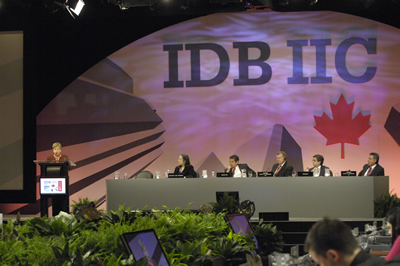"The Time for Equality Has Arrived in Latin America and the Caribbean"
Topic(s)
Alicia Bárcena proposed six pillars for a new economic strategy emphasizing investment, integration and innovation at the 52nd annual meeting of the Board of Governors of IDB.

Watch video “Time for equality” (in Spanish, subtitles in English)
(28 March 2011) "Latin America and the Caribbean can safely take on its role in the new inclusive world scenario", according to Alicia Bárcena, Executive Secretary of ECLAC, speaking today.
The senior United Nations official was taking part in the second plenary session of the 52nd annual meeting of the Board of Governors of the Inter-American Development Bank (IDB), being held today in Calgary, Canada.
"The time for equality has arrived in the region", she declared. She proposed six pillars for a new economic strategy emphasizing investment, integration and innovation, so as to ensure productive convergence, a greater number and quality of jobs and environmental stability.
She stated that the global crisis and today's challenges (including strong capital inflows and increasing inflationary pressure caused by rising oil and food prices) call for new approaches to development. She said that "the world economy and the financial system have to be more equitable, fair and stable so that the benefits of progress reach everyone, including the poorest".
Ms Bárcena added "we are proposing a new approach to development, a strategy for sustainable and equitable growth based on equality". She emphasized that social equality and economic growth are not incompatible, and that it is vital to increase the State's capacity to redistribute resources and promote equity.
"Latin America and the Caribbean now has the opportunity to make use of this recently acquired resilience to act according to a long-term vision, in order to create the necessary conditions to achieve robust growth that is more equitable and sustainable", she declared in a speech delivered to IDB representatives.
She pointed out that ECLAC is forecasting GDP growth of 4.2% for the region in 2011, which is more moderate than the 6.1% for 2010, as well as a one percentage point reduction in poverty for last year (down to 32.1% of the population, compared with 33.1% recorded in 2009).
In the framework of the annual IDB meeting, the ECLAC Executive Secretary was also one of the main speakers at the seminar "Faced with the development challenges in Latin America: what are the articulation possibilities between a European bilateral development agency and multilateral institutions active in the region?" and moderated the meeting on "Private Sector Investments and Socially Responsible Development of Natural Resources".
At the latter, she highlighted the fact that the new patterns of commercial and economic integration with Asia, and especially China, pose new challenges for the development strategy of Latin America and the Caribbean. These challenges include reviews of the regulatory frameworks of sectors related to natural resources, and the increase of the amount of investment in infrastructure, which is key for the export of such products.
She claimed that the region should improve existing fiscal and contractual mechanisms intended to ensure sufficient income generation for the State, without endangering the investment boost needed to develop natural resources. At the same time, she also described it as essential to implement institutional arrangements to guarantee efficient use of any profits generated.
Any queries should be addressed to the ECLAC Public Information and Web Services Section.
E-mail: dpisantiago@cepal.org; Telephone: (56 2) 210 2040.
Related content
Quincuagésima segunda reunión anual de la asamblea de gobernadores del Banco Interamericano de Desarrollo
Por Alicia Bárcena, Secretaria Ejecutiva de la CEPAL
Country(ies)
- Latin America and the Caribbean
Contact
Public Information Unit
- prensa@cepal.org
- (56 2) 2210 2040